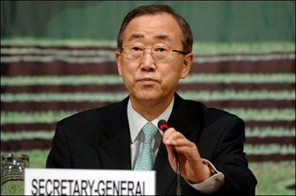UN chief to lobby Myanmar
YANGON: The U.N. secretary-general said he would lobby Myanmar's junta chief directly Friday for the release of pro-democracy leader Aung San Suu Kyi, acknowledging that his high-profile mission will be "very difficult."
Shortly after U.N. Secretary-General Ban Ki-moon arrived in Myanmar, the court presiding over Suu Kyi's widely criticized trial announced an adjournment until July 10. The trial had been due to resume Friday after a monthlong delay with Suu Kyi's final defense witness taking the stand.
If Ban is allowed to meet with Suu Kyi, he will be the first U.N. secretary-general to do so since her first period of detention started in 1989. U.N. spokeswoman Michele Montas said earlier this week that Ban will push to personally meet her.
The 64-year-old Nobel Peace Prize winner is charged with violating the terms of her house arrest when an uninvited American man swam secretly to her lakeside home and stayed for two days. She has pleaded not guilty but faces five years in prison if convicted.
The trial has prompted an outpouring of outrage from world leaders, Hollywood celebrities, Nobel laureates and human rights groups who say the junta is using the bizarre incident as an excuse to keep Suu Kyi behind bars through elections scheduled for 2010. Suu Kyi has been in detention for more than 13 of the last 19 years.
Ban was escorted by police motorcade into Yangon, the commercial capital, after his arrival.
He was scheduled to fly later in the day to Naypyitaw, the remote administrative capital, for talks with the country's leaders, including a one-hour session with the junta chief, Senior Gen. Than Shwe.
"I'm going to argue for the release of all political prisoners, including Aung San Suu Kyi," Ban told reporters late Thursday in Singapore, adding that he plans to "raise her case directly" with Than Shwe. Ban is also scheduled to meet Prime Minister Gen. Thein Sein.
"This is going to be, I know, a very difficult mission. But at the same time I know that to bring changes to Myanmar, political conciliation and democratization, we need to do our best," Ban said.
He also said he would "convey the concerns of the international community, about the slow pace of political conciliation and democratization process."
He will later meet ethnic minority groups and leaders of political parties including senior members of Suu Kyi's party, the National League for Democracy, who were driven to Naypyitaw on Thursday, government officials said on condition of anonymity because they were not authorized to discuss the itinerary.
Ahead of the trip, Ban said his talks would focus on "three of the most important issues for the future of Myanmar." They are gaining the release of all political prisoners including Suu Kyi; resumption of dialogue between the military government and its opposition; and creating conditions for credible elections.
Suu Kyi told her lawyers during a two-hour meeting Thursday that "these three issues are very important" and reiterated that national reconciliation is key to solving country's problems.
Suu Kyi is being detained at Myanmar's notorious Insein Prison, as is John William Yettaw, 53, of Falcon, Missouri, the intruder who is charged with trespassing.
Her trial was delayed for a month while lawyers appealed the court's decision to ban three key witnesses, one of whom was reinstated by an appeals court.
Defense witness Khin Moe Moe — a lawyer and member of Suu Kyi's National League for Democracy — was due to testify Friday. But the presiding judge told lawyers that the case file had not yet been returned by the appeals court that had ruled to reinstate the witness, said attorney Nyan Win.
Suu Kyi's supporters fear that Suu Kyi will be found guilty because the courts are under the influence of the ruling junta and usually mete out harsh punishment for political dissidents.
President Barack Obama has called the case a "show trial based on spurious charges."
Suu Kyi's opposition party won national elections in 1990, but Myanmar's military junta refused to relinquish power. Her latest six-year round of house arrest was due to expire last month.
Human Rights Watch urged Ban to make the trip "meaningful" after years of failed U.N. attempts to win Suu Kyi's freedom and promote democratic reforms. Myanmar has been under military rule since 1962.
"Time and again, the U.N. has politely requested Aung San Suu Kyi's release, but her 'release' back to house arrest would be a huge failure," Kenneth Roth, the executive director of Human Rights Watch said in a statement. "He should make it clear that the time for stalling and playing games is over and that real change is needed now."
Before leaving Saturday evening, Ban was scheduled to meet foreign diplomats and fly over the devastated Irrawaddy delta, which he visited last year in the aftermath of Cyclone Nargis. The cyclone killed 138,000 people.






